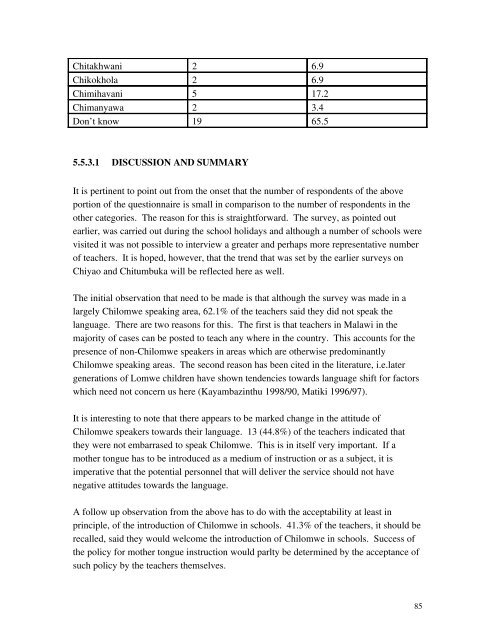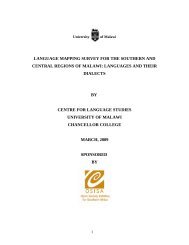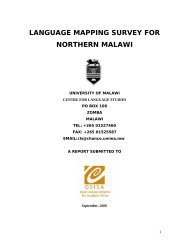SOCIOLOLINGUISTIC SURVEYS - Centre for Language Studies
SOCIOLOLINGUISTIC SURVEYS - Centre for Language Studies
SOCIOLOLINGUISTIC SURVEYS - Centre for Language Studies
You also want an ePaper? Increase the reach of your titles
YUMPU automatically turns print PDFs into web optimized ePapers that Google loves.
Chitakhwani 2 6.9<br />
Chikokhola 2 6.9<br />
Chimihavani 5 17.2<br />
Chimanyawa 2 3.4<br />
Don’t know 19 65.5<br />
5.5.3.1 DISCUSSION AND SUMMARY<br />
It is pertinent to point out from the onset that the number of respondents of the above<br />
portion of the questionnaire is small in comparison to the number of respondents in the<br />
other categories. The reason <strong>for</strong> this is straight<strong>for</strong>ward. The survey, as pointed out<br />
earlier, was carried out during the school holidays and although a number of schools were<br />
visited it was not possible to interview a greater and perhaps more representative number<br />
of teachers. It is hoped, however, that the trend that was set by the earlier surveys on<br />
Chiyao and Chitumbuka will be reflected here as well.<br />
The initial observation that need to be made is that although the survey was made in a<br />
largely Chilomwe speaking area, 62.1% of the teachers said they did not speak the<br />
language. There are two reasons <strong>for</strong> this. The first is that teachers in Malawi in the<br />
majority of cases can be posted to teach any where in the country. This accounts <strong>for</strong> the<br />
presence of nonChilomwe speakers in areas which are otherwise predominantly<br />
Chilomwe speaking areas. The second reason has been cited in the literature, i.e.later<br />
generations of Lomwe children have shown tendencies towards language shift <strong>for</strong> factors<br />
which need not concern us here (Kayambazinthu 1998/90, Matiki 1996/97).<br />
It is interesting to note that there appears to be marked change in the attitude of<br />
Chilomwe speakers towards their language. 13 (44.8%) of the teachers indicated that<br />
they were not embarrased to speak Chilomwe. This is in itself very important. If a<br />
mother tongue has to be introduced as a medium of instruction or as a subject, it is<br />
imperative that the potential personnel that will deliver the service should not have<br />
negative attitudes towards the language.<br />
A follow up observation from the above has to do with the acceptability at least in<br />
principle, of the introduction of Chilomwe in schools. 41.3% of the teachers, it should be<br />
recalled, said they would welcome the introduction of Chilomwe in schools. Success of<br />
the policy <strong>for</strong> mother tongue instruction would parlty be determined by the acceptance of<br />
such policy by the teachers themselves.<br />
85





